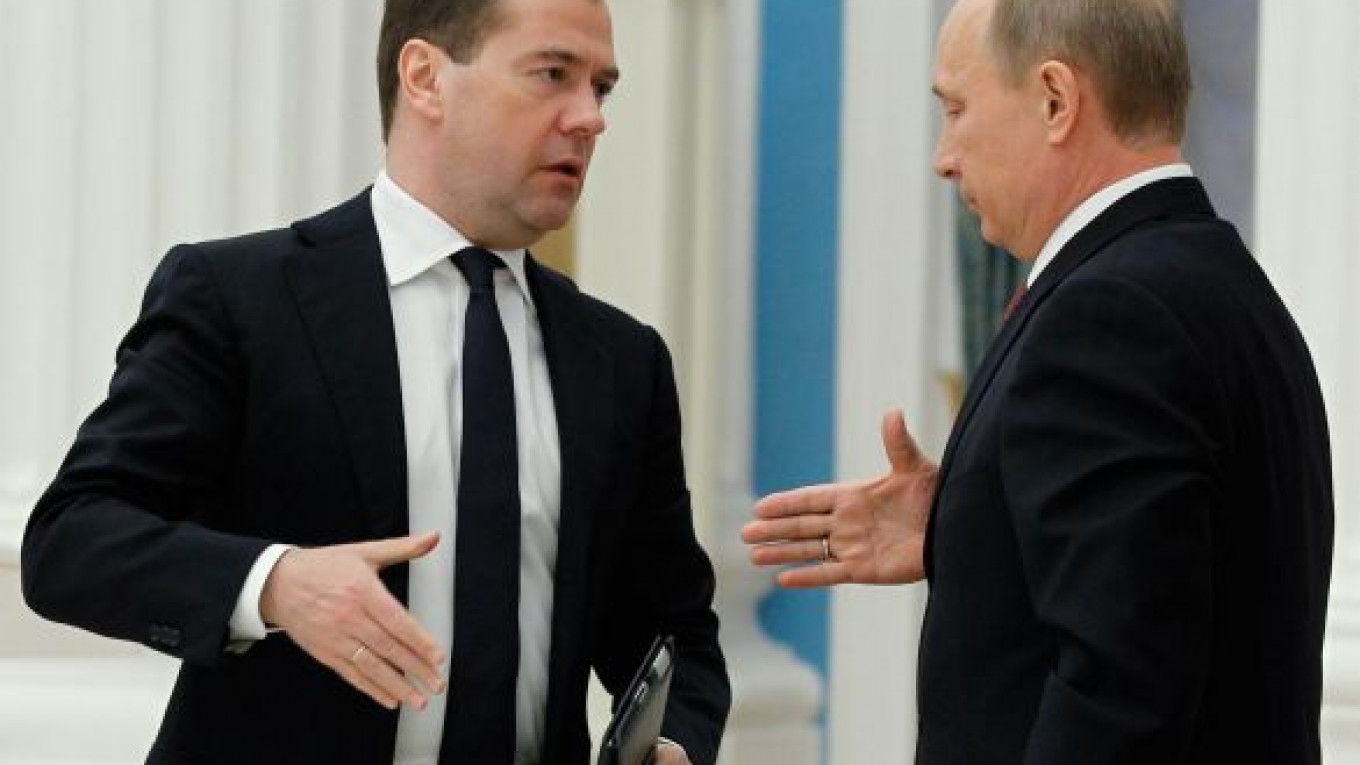Prime Minister Dmitry Medvedev took the floor in the Kremlin on Thursday to outline a wide range of goals for his Cabinet, in a move seen as a show of unwavering support for him from President Vladimir Putin.
Most of the goals, such as improving the conditions for business, resembled the targets that several previous governments set for themselves. Medvedev said, however, that he will make more headway over the next five years, until the presidential elections in March 2018.
"We need five years of effective development," he said.
Medvedev spoke at the Kremlin's high-domed Yekaterininsky Hall, with his entire Cabinet, Putin and selected governors listening and seated around a large conference table. Opening the meeting, Putin said it was crucial that it took place in the Kremlin.
A Russian prime minister had never before delivered a long-term vision of his goals in such a format.
Medvedev said he wanted annual economic growth to be at least 5 percent.
He identified 10 key goals. In addition to improving the business climate, they included developing cooperation with partners in the World Trade Organization, the European Union, Asian countries and the customs union with Belarus and Kazakhstan.
Also on the list of goals are applying new technology, supporting domestic demand, helping the farmers, and providing better basic services by building more roads, expanding the electric grid and making high-quality phone and Internet connections more accessible.
Besides, Medvedev said he will focus on residential construction, social services like health care and education, regional development and the quality of government.
State programs that the Cabinet had been approving will be the tools to accomplish the goals, Medvedev said.
Dvorkovich said after the meeting that the Cabinet will adopt all of the state programs by the end of June.
In the Kremlin, Putin warned that the economy had slowed in the last two quarters, which means Medvedev would have to reverse the trend to fulfill his ambitions.
Putin also weighed in on one of the sources for future investment: retirement pension money. People should be able to have a chance to invest their savings beyond the January 2014 deadline he set last year, he said.
He also guided the Cabinet to focus on more immediate tasks, such as gasoline prices. Farmers must be able to afford fuel for the spring sowing season, he said.
Yury Korgunyuk, a political analyst at the Indem think tank, said the Kremlin gathering sought to assure Medvedev that he still enjoyed Putin's full support.
Korgunyuk said the meeting was an answer to widespread speculation that Medvedev's days as prime minister were numbered.
"The show of today's event means serious infighting is going on in Putin's entourage," Korgunyuk said. "It's a battle of bulldogs under the carpet."
Korgunyk dismissed Medvedev's speech per se as deserving little attention.
"No one pays attention to the content any more. What matters is the context and subtext," he said. "Anything of importance is communicated behind the scenes."
Alexei Mukhin, director of the think tank Center for Political Information, agreed that people should read between the lines for the real meaning behind the Kremlin get-together. But he said the point was that Medvedev showed his loyalty to Putin by pledging once again to make Putin's campaign promises materialize.
Contact the author at medetsky@imedia.ru
Related articles:
A Message from The Moscow Times:
Dear readers,
We are facing unprecedented challenges. Russia's Prosecutor General's Office has designated The Moscow Times as an "undesirable" organization, criminalizing our work and putting our staff at risk of prosecution. This follows our earlier unjust labeling as a "foreign agent."
These actions are direct attempts to silence independent journalism in Russia. The authorities claim our work "discredits the decisions of the Russian leadership." We see things differently: we strive to provide accurate, unbiased reporting on Russia.
We, the journalists of The Moscow Times, refuse to be silenced. But to continue our work, we need your help.
Your support, no matter how small, makes a world of difference. If you can, please support us monthly starting from just $2. It's quick to set up, and every contribution makes a significant impact.
By supporting The Moscow Times, you're defending open, independent journalism in the face of repression. Thank you for standing with us.
Remind me later.






